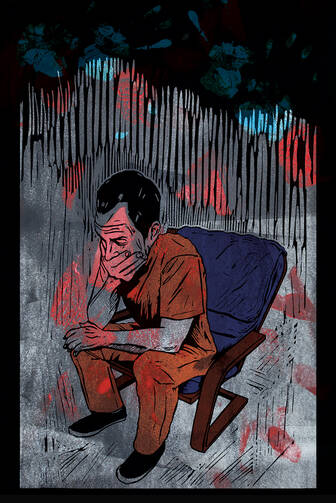I was seated at the back of the room as 60 or so inmates gathered for the weekly Tuesday night meeting of Criminals and Gangmembers Anonymous. Most of the members are serving life sentences, many with the distant possibility of parole, although a few are LWOPs, which stands for lifers without that possibility. To begin the session one of the group leaders stood before his fellow inmates and asked that they pause for a moment of silence. The room went quiet and heads bowed.
Moments of silence usually are not my favorite moments. They seem to be a second choice, a watered-down option when a prayer would be either illegal or politically incorrect. The person leading the meeting or the ceremony or whatever asks for a moment of silence, and I confess that all I hear in the solemn hush are the unspoken questions echoing inside the speaker’s mind: How long is a moment supposed to last? Is this long enough? What shall I say to end it? I hear the presider’s brain, counting and considering, One-Mississippi, two-Mississippi, three-Mississippi, four-Mississippi.... O.K., that’s probably long enough. Is it? Hmmm. Or maybe now. When the moment of silence is finally broken, all I feel is relief.
After that Tuesday night, however, I took it all back. I am a staff facilitator for the Criminals & Gangmembers Anonymous prison program rather than a participant in the group, which means that I do the paperwork while the inmates meet. It was National Crime Victims Week, and I had received some literature regarding commemorations and tributes around the state. Since the C.G.A. motto is “One less crime, one less victim,” I thought it would be appropriate to ask one of the group leaders to mention the week’s designation and to call for a moment of silence for all who had been victimized by the perpetrators in the room.
On that night, the moment was fully embraced. Thoughts turned inward. Suddenly the air was weighted with a collective heaviness of heart. Part of the rehabilitative process is learning to develop empathy for what you, as a criminal, have put your victims through by your actions. This means you must take responsibility not only for your immediate victims but also for their families, your family and the greater society whose laws you have broken. You must be able to walk in the shoes of all of these, the people to whom you have caused grave injury or death or disability or fear or material loss or psychological harm, before you can ask for forgiveness from those you have harmed. You must learn the meaning of compassion before you can ask for compassion. Above all, you must never forget or try to minimize the impact and consequences to others of the wrongs you have done.
I could thus imagine the many faces conjured in the minds of the inmates present at the meeting: faces of loved ones or random strangers, faces of terror or shock, faces that may haunt their dreams or inhabit their thoughts. The pain of the victims of murder, kidnapping, rape, molestation, robbery, cheating, beating and mayhem of every kind was palpable as these men remembered the debts they will never really be able to pay. Those who suffered because of the people in this room were young, old, male, female, beloved, unknown, innocent, guilty, in the wrong place at the wrong time—all their lives taken or forever changed by the felons, these men, who bowed their heads together. The moment was collective, but each man remembered separately.
I could feel the regret rising to the ceiling of the chapel where we met. I could sense the past reaching with long fingers to tap each man on the shoulder: Remember me? Remember what you did?
Victims and their families sometimes feel they are ignored or forgotten in the rehabilitative process. They often do not want to read letters of apology from men they consider monsters; they do not want to hear about the criminal’s rehabilitation; they do not want the offender ever to get a parole date; they do not want to forgive, possibly, in the case of families of murder victims, because they feel that forgiveness would be like forgetting their loved one or, worse, dishonoring him or her. But on this night, during this powerful, and surely prayerful, moment, the victims were present. This is small consolation to those who have been victimized, I know. But it is perhaps a place for healing to begin.
Along with the regret, I could also sense, rising like incense, the promise to be better men. Some may consider me naïve, but I believe that each man’s slog through the C.G.A. program is a response to the holy call—the call to be the person God created him to be, to heal whatever is broken within him, to reach for redemption. People can do truly terrible things to one another, but every soul is sacred. Every human being is a beloved child of God, even the ones most of us have given up on ever reaching.
Later, back at home, I took my own moment in the silent night to pray for this earth full of grief, for victims and perpetrators, for all of our sorry souls. Then, remembering God’s abiding love, which gathers all our woundedness like a mother to her heart, I gave thanks for that night’s moment of silence.








